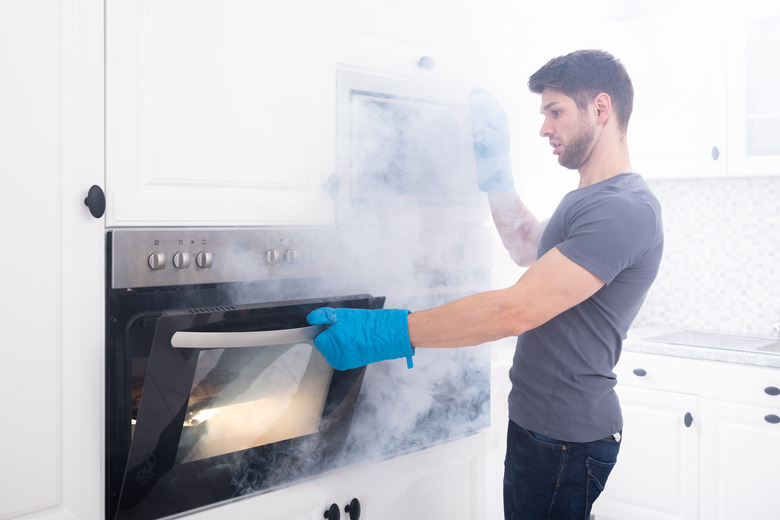Common Causes Of Oven Fires
We may receive a commission on purchases made from links.
The kitchen is a prime spot for house fires to start. Grease fires on the stovetop are common, but many issues can also cause an oven fire. While the oven helps contain the flames if a fire starts, it can still spread to other parts of the home. Being aware of the common causes of oven fires can help you avoid the situation.
Oven Fire From a Malfunction
Oven Fire From a Malfunction
Sometimes it's the appliance itself that's to blame for a kitchen fire. Electric ovens have heating elements that can malfunction and cause sparks, which can lead to a fire. Keep your oven in good repair to avoid a malfunction. If you suspect a problem, have the oven inspected to make sure it's in good working condition.
Splattering Grease in the Oven
Splattering Grease in the Oven
Greasy foods that are baked, roasted, or broiled in the oven could cause a grease fire. The fat and grease can splatter as it heats up. If the grease lands on the heating element, it can ignite.
Covering food that's fatty or greasy before putting it in the oven can prevent splatters. Position the oven rack to keep the food a safe distance from the heating element. If you put something greasy directly under the broiler, you increase the chances of a grease fire starting. Keep an eye on the food while it cooks to make sure grease isn't splattering around the oven.
Ingredients Bubbling Over
Ingredients Bubbling Over
Another food-related cause is a dish that bubbles out of the pan. If you overfill the pan, the ingredients can rise and spill over the edges as it bakes. This might happen with cakes if the batter bubbles over due to being overfilled. When the food hits the heating element, it can start an oven fire.
Prevent this issue by following your recipe for filling recommendations. Avoid loading the pan to the top and allow room for baked goods to rise. You can also place a baking sheet under the pan to catch spills if you're concerned about a dish bubbling over the edges.
Dirty Oven or Racks
Dirty Oven or Racks
The risk of an oven fire increases over time if you don't clean it occasionally. Little bits of food tend to spill in the oven even if you don't have a major spill all at once. If the food debris builds up enough, it can catch on fire. Clean any spills as soon as the oven cools to prevent buildup. Clean your oven regularly to keep messes under control.
Food Left Unattended
Food Left Unattended
When you're busy, you might forget that you're cooking something in the oven. You might end up leaving the oven on when you have to run out for an unexpected errand. If you forgot to turn the oven off while you were cooking food or left the food unattended, it could eventually catch on fire. Set a timer to remind yourself of food you have cooking in the oven. If you set the timer on your phone, you'll have it with you all the time, even if you leave the house, so you're sure to get the reminder.
Flammable Items in the Oven
Flammable Items in the Oven
For the safety of your home, oven, and other belongings, only use your oven for baking and cooking. Some people store items in the oven when it's not in use. If you forget about those items and turn your oven on to preheat it, the items stored inside might start a fire.
Likewise, you should never use the oven for other purposes, such as heating your home or drying nonfood items in it. These activities can increase the chances of a fire starting.
When it comes to baking, only use oven-safe pans and dishes. If you want to line the pan, use oven-safe parchment paper. Never use wax paper, which isn't heat-resistant and could melt or catch on fire in the oven.
